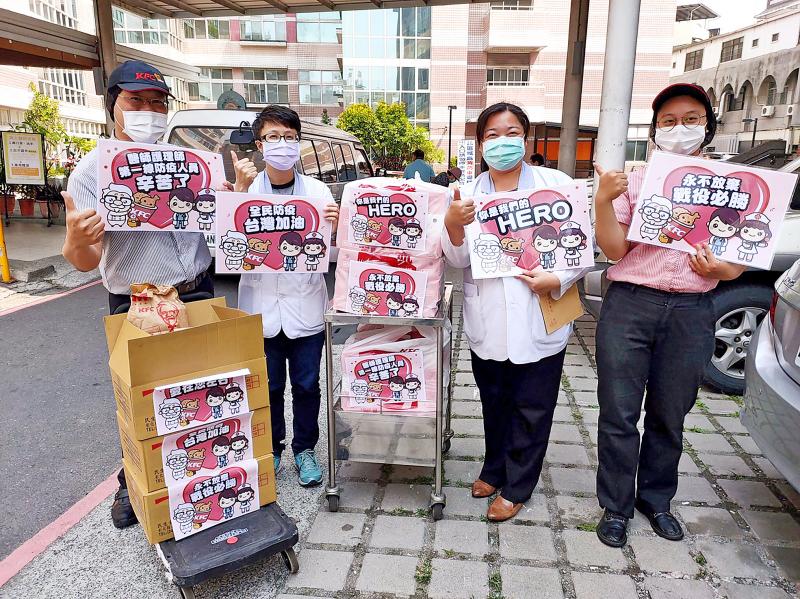Local governments can decide whether shuttered businesses can resume operations as long as they apply measures to prevent the spread of COVID-19, the Central Epidemic Command Center (CECC) said yesterday.
Taiwan has not reported a local infection for 26 days, showing that the nation’s disease situation has stabilized, Minister of Health and Welfare Chen Shih-chung (陳時中), who heads the center, told a daily news briefing in Taipei.
As of yesterday, the nation had recorded 440 cases, including six deaths, 349 of them imported, 55 local infections and 36 from the Panshih (磐石) navy supply vessel, among whom 355 have been released from quarantine after treatment, center data showed.

Photo: CNA
Despite the easing situation, people should continue to practice disease prevention measures, Chen said, adding that continued vigilance would bring a relaxing of rules.
Chen announced four requirements for local governments to evaluate whether suspended businesses should resume operations.
They should maintain proper social distancing — 1.5m indoors and 1m outdoors — among customers; promote personal hygiene measures, such as requiring visitors to wear masks, checking their temperature and providing disinfectant; control visitor flow, keep a register of people entering the premises and regularly sanitize the environment; and ensure that fire prevention and security systems are in order, he said.
Businesses that fulfill these conditions can be freed from the center’s guidance that groups of 100 indoors or 500 outdoors should be avoided, he said.
The center on April 9 announced that hostess clubs and dance clubs should suspend operations after a hostess in northern Taiwan tested positive for the coronavirus.
Asked why the center said local authorities had the final say in easing restrictions, Chen said that the center offers disease prevention guidelines, but local governments enforce the rules.
Municipalities can make a decision after assessing their own disease prevention capacity and that of businesses, he said.
Chen also promised that the government would improve the system for individual applications for NT$10,000 grants to ensure that people in need can get money.
Premier Su Tseng-chang (蘇貞昌) on Thursday apologized for failing to clarify the rules to apply for the grants for uninsured workers.
Su said he would shoulder all responsibility for the long lines and confusion over the application process.
Earlier yesterday, President Tsai Ing-wen (蔡英文) said that Su would be retained to lead the Cabinet on May 20, the start of her second term.
Separately, the center said that the Ministry of Health and Welfare has partnered with Facebook on a service aimed at providing timely and reliable information on the pandemic.
CECC spokesman Chuang Jen-hsiang (莊人祥) said that people can use the Facebook messaging app and a chatbot developed by the social media company to ask questions about the pandemic at any time.
People can get up-to-date domestic and overseas information about the pandemic, learn how to prevent COVID-19 and find out where masks can be purchased, the CECC said in a statement.
The service is only available in Chinese, it said.
Additional reporting by CNA

AGING: As of last month, people aged 65 or older accounted for 20.06 percent of the total population and the number of couples who got married fell by 18,685 from 2024 Taiwan has surpassed South Korea as the country least willing to have children, with an annual crude birthrate of 4.62 per 1,000 people, Ministry of the Interior data showed yesterday. The nation was previously ranked the second-lowest country in terms of total fertility rate, or the average number of children a woman has in her lifetime. However, South Korea’s fertility rate began to recover from 2023, with total fertility rate rising from 0.72 and estimated to reach 0.82 to 0.85 by last year, and the crude birthrate projected at 6.7 per 1,000 people. Japan’s crude birthrate was projected to fall below six,

US President Donald Trump in an interview with the New York Times published on Thursday said that “it’s up to” Chinese President Xi Jinping (習近平) what China does on Taiwan, but that he would be “very unhappy” with a change in the “status quo.” “He [Xi] considers it to be a part of China, and that’s up to him what he’s going to be doing, but I’ve expressed to him that I would be very unhappy if he did that, and I don’t think he’ll do that. I hope he doesn’t do that,” Trump said. Trump made the comments in the context

SELF-DEFENSE: Tokyo has accelerated its spending goal and its defense minister said the nation needs to discuss whether it should develop nuclear-powered submarines China is ramping up objections to what it sees as Japan’s desire to acquire nuclear weapons, despite Tokyo’s longstanding renunciation of such arms, deepening another fissure in the two neighbors’ increasingly tense ties. In what appears to be a concerted effort, China’s foreign and defense ministries issued statements on Thursday condemning alleged remilitarism efforts by Tokyo. The remarks came as two of the country’s top think tanks jointly issued a 29-page report framing actions by “right-wing forces” in Japan as posing a “serious threat” to world peace. While that report did not define “right-wing forces,” the Chinese Ministry of Foreign Affairs was

PREPAREDNESS: Given the difficulty of importing ammunition during wartime, the Ministry of National Defense said it would prioritize ‘coproduction’ partnerships A newly formed unit of the Marine Corps tasked with land-based security operations has recently replaced its aging, domestically produced rifles with more advanced, US-made M4A1 rifles, a source said yesterday. The unnamed source familiar with the matter said the First Security Battalion of the Marine Corps’ Air Defense and Base Guard Group has replaced its older T65K2 rifles, which have been in service since the late 1980s, with the newly received M4A1s. The source did not say exactly when the upgrade took place or how many M4A1s were issued to the battalion. The confirmation came after Chinese-language media reported